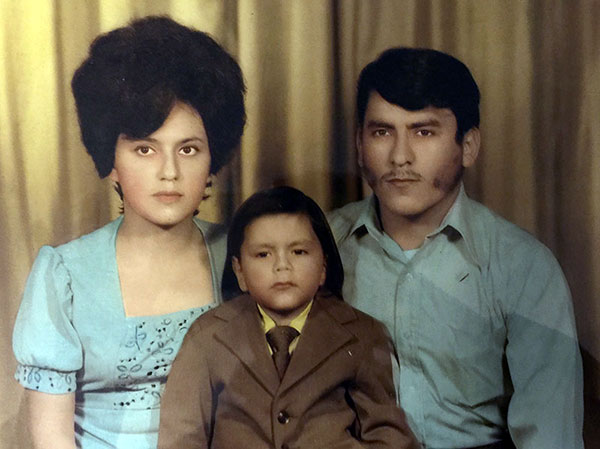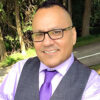Joe: My Personal English Learner Story

My name is José, but when I was six years old, my first-grade teacher changed it to Joe. Her decision to do so, continues to impact my life daily – as a person, as an educator, and as an advocate for all students, but especially for those who like me, are looked down upon for not having English as a first language.
It started when I was kicked out of Kindergarten. My parents, in their early twenties and recently having moved to El Paso from Ciudad Juárez, took me to my local elementary escuela in one of the large school districts in the city. Because I only spoke español like my parents, and also, because I was a nervous child, I did not react positively to school. I kicked, I bit adults, I urinated on myself, and I would run out of the classroom daily. After several weeks, the principal informed my parents that I “had to mature” and, therefore, would need to stay home and be brought back as a first grader.
I guess I was afraid that I would never be enough if people knew my real name – if people knew that Spanish, not English, was the language closest to my heart.
At the age of six, I returned to the same school only to do the exact same thing as before. Once again, the school principal informed my padres that I could no longer attend the school. This was in 1977 and the U.S. Supreme Court Case, Lau vs. Nichols, had not yet fully made its way to the border town in Texas. I was a six-year old English learner without a school to attend.
My Godmother, mi madrina, informed my parents that they should enroll me in a local Catholic School because there, the nuns would be able to “fix” me. On the first day at the private school, I once again did the things that got me kicked out of public school. However, this time it was different. Una monja, a nun, who my parents understood to be the principal, had a gurney rolled into her office from the nurse’s office. I was placed on the rolling bed, strapped in so that my arms and legs were not able to move, and I was rolled through the school hallways to my first-grade class.
Even as I remember this life-altering event, I can see my young Mamá and Papá with tears in their eyes, seeing their firstborn child tied and delivered to his classroom. My teacher introduced me to the rest of the class as the new student – Joe. So, I lay there, watching my parents escorted away from the classroom, urine-stained clothes on my body, and flat on my back, wishing that I was somewhere else…anywhere…but not in that classroom.


Continue reading to find out more of José’s journey….
As you read this, some of you may be thinking, ‘but José, you made it; you are doing great for yourself.’ Stop. Realize. I am the exception, not the norm.
Days later, having decided that I no longer wanted to be tied to a gurney, I told myself that I had to learn English…that I had to “act” like the other students. I asked my parents if I should let my teacher know that my name was José. Mi Mamá me dijo, “haces lo que te diga la maestra.” Do what the teacher tells you. So, I dutifully and without objection, became Joe.


In that moment, when my identity and name were taken from me, my life was forever altered. Spanish, my beautiful native language, la música de Juan Gabriel, my favorite telenovelas on the Televisa Network, and the TV show el Chavo del Ocho – were forbidden in my English world, in my school.
As you read this, some of you may be thinking, “but José, you made it; you are doing great for yourself.” Stop. Realize. I am the exception, not the norm.
English learners today may no longer be tied to gurneys in a physical fashion, but many are still lying flat on their backs with their hands and legs bound by metaphorical straps. Some of you may even know teachers that are responsible for such situations. Perhaps, even you, have been the one tying language learners down without realizing it.
We are good people. We are educators. And, we became teachers because we wanted to help others have educational access. As we serve students who are adding English to their repertoire while in U.S. schools, we must remember the following three things:
- Value all that a student brings into our classroom. If an English learner enrolls in our school and is placed in our classroom, we should not say to others that the student “doesn’t know a thing.” Each language learner is a unique and awesome individual who is just waiting for us, their teacher, to create connections between that which they know and that which we want them to learn. Just because a student does not speak and/or understand English, it does not erase all that he/she brings into the classroom!
- Have an additive mindset about language learning. Our job is not to transition kids to English. The students’ native tongue is not something to be exploited in order to ensure success on standardized assessments. We must instead, value our students’ first language and culture as we strengthen connections between the native tongue and English simultaneously. English and other languages can co-exist in the mind and the heart of a student beautifully!
- We must learn, practice, and write our students’ names correctly. My real name is not Joe. My true name is José. José has an accent over the letter “e” and if you don’t place the accent when writing my name, you are diminishing my language and culture. María is not Mary. Françoise’s name should not be changed to Frankie. Nuan is a beautiful name, so we must learn it. The name Akmal-Alam signifies a beautiful universe and does not deserve to be change to Alan. We learned how to pronounce the names Dostoyevsky and Schwarzennegger and we must now, also give value to the names of the students and families we serve!
Continue on to the next page to learn more about José’s journey…
I want you to know that I often think of my first-grade teacher. A part of me wants to be angry towards her, but I am not. Although I will never know her intent in changing my name to Joe, the name is now a part of me.
It took me decades, really not until my twenties and thirties, to slowly begin to take ownership of my birth name, my family background, my culture, and my language. I guess I was afraid that I would never be enough if people knew my real name – if people knew that Spanish, not English, was the language closest to my heart.
So, there are those that to this day call me Joe – and I graciously respond because that is the name that at the age of six was given to me by an educator. But, now that I am fully capable of owning ALL that I am, I prefer to introduce myself using my real name.
¡Hola, mi nombre es Dr. José Luis Medina Hernández Franco López Jr. Díaz-Cruz!

